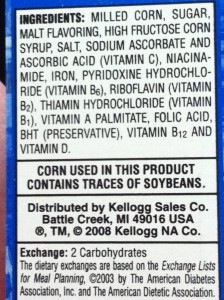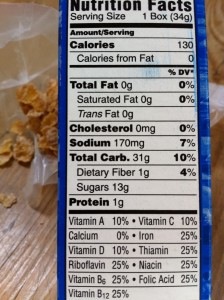Enjoy the breakfast selections!
Email subscribers might have to go to Eat Out Eat Well to see the video.
Enjoy the breakfast selections!
Email subscribers might have to go to Eat Out Eat Well to see the video.
 I was having breakfast with a five year old who insisted on taking an individual box of Frosted Flakes from a display. Of course she would, the little box is designed to appeal to a child.
I was having breakfast with a five year old who insisted on taking an individual box of Frosted Flakes from a display. Of course she would, the little box is designed to appeal to a child.
I’m not a cold cereal lover, but I have been known to grab a handful or two of those sugar coated flakes when they are sitting in front of me (without milk – it destroys the crunch).
Because I haven’t had a box of Frosted Flakes in front of me for a long time and I like to think of myself as an informed adult, I picked up the cute little royal blue box with Tony the Tiger on the front to read the nutrition and ingredients labels.
What a shocker. I knew that Kellogg’s Sugar Frosted Flakes of Corn was not nutritionally stellar – but what a shock to read the front of the box hype and then to look at the labels.
The cereal, first introduced in 1952 as Sugar Frosted Flakes, is described as sweet and crunchy and “packed with 10 essential vitamins and good-for-you grains that give you the great-tasting energy you need.” The tagline reads: “It’s what fuels you up so you can play, prep and be your very best.”
Take a peek at the nutrition label. Notice the amount of protein and fiber (or, essentially, lack of). How much sugar is there? Look at the ingredients label.What are the first five ingredients?
 My youngest son once ate an astonishing double digit number of little boxes of Frosted Flakes, without milk, at summer sleep-away camp – a story first told to me by his brothers and validated by the counselors. Can you imagine what his behavior must have been like that day on a massive sugar overload from breakfast cereal? No wonder the camp changed its breakfast policy – and its breakfast foods!
My youngest son once ate an astonishing double digit number of little boxes of Frosted Flakes, without milk, at summer sleep-away camp – a story first told to me by his brothers and validated by the counselors. Can you imagine what his behavior must have been like that day on a massive sugar overload from breakfast cereal? No wonder the camp changed its breakfast policy – and its breakfast foods!
Is it time to change your breakfast?
My Mom always made me eat a “good” breakfast – eggs, leftover hamburgers from the night before, some kind of hot cereal made with milk. My Mom grew up on a working farm – and farmers had the right idea about the need to fuel themselves for the coming day (and to use whatever food was on hand). The habit of eating a healthy breakfast has stuck with me, but even though many of you know how important it is, you probably don’t always make it a priority or carve out enough time to do it.
The advice to eat a good breakfast has been around for centuries. It’s clear how it affects your body’s biology, but now it’s being documented that eating a healthy breakfast — especially one high in protein – can leave you feeling fuller and less hungry throughout the day.
Research published in the journal Obesity studied teens who either skipped breakfast or ate a 500 calorie breakfast of cereal and milk (with normal amounts of protein) or higher protein meals like Belgium waffles with added protein, syrup, and yogurt for three weeks.
At the end of each week, the teens filled out appetite and satiety questionnaires, and had a brain scan before lunch that used functional magnetic resonance imaging (fMRI) to identify brain activation responses.
The researchers focused on teens because 60% of them skip breakfast and breakfast skipping is strongly associated with unhealthy snacking, overeating (especially at night), weight gain, and obesity.
The results showed that eating breakfast led to increased fullness and less hunger throughout the morning. The fMRI showed that before lunch there was also reduced brain activity in regions that control food motivation and reward.
Eating breakfast reduced brain signals that lead to reward driven eating behavior when they’re active. The higher protein breakfast produced greater feelings of satiety and changes in reward driven eating behavior than the normal protein milk and cereal meal.
Since skipping breakfast is associated with more snacking and food cravings, breakfast — especially one that is rich in protein — could be an effective strategy in controlling appetite and preventing overeating.
 In girth that is. The chef’s weight loss is frequently motivated by a health scare – although sometimes just by vanity or wanting to be more mobile and agile in the kitchen — many star chefs have devised their own plans for losing weight.
In girth that is. The chef’s weight loss is frequently motivated by a health scare – although sometimes just by vanity or wanting to be more mobile and agile in the kitchen — many star chefs have devised their own plans for losing weight.
Fortunately, for them, they have knowledge and their skill in the kitchen at their disposal to make food more flavorful, perhaps downright delicious, while cutting back on the use of sugar, fat, and salt.
According to an article in The Daily News, what they do is:
Whatever routine a chef follows, they all seem to have become aware of portion sizes. They’ve learned about calories and the overabundance of sugar, fat, and salt in many recipes. And, they move more. They do not deprive themselves. They may restrict the amount of food that they eat – but they are eating whole food with good flavor and they’re making room for the occasional, not daily, indulgence.
Art Smith cautions that dessert is a treat. As he says, “If you have dessert every day, then it’s no longer a treat.”
Try following their strategies when you’re cooking at home – or even when ordering in a restaurant.
If we could just get more chefs to offer smaller portions of delicious and healthy whole foods in their restaurants and food companies to do the same with their prepared products it would be a whole lot easier to lose and/or maintain weight and to be mindful of portion size.
I had a weird day yesterday. Everything was out of sync. It started with breakfast. With rare exception, I have nonfat Greek yogurt with fruit and two tablespoons of Grape Nuts every morning.
Yesterday was an exception. I didn’t have a bad breakfast – for a lot of people. It just wasn’t a good breakfast for me.
I ate at a local diner and ordered the “special” oatmeal with walnuts and apples. The steaming bowl arrived with the oatmeal liberally sprinkled with walnut halves and stewed apples that were quite sweet and floating in a generous amount of syrup.
The simple fact is that I cannot eat sweet stuff in the morning. I also cannot eat oatmeal unless it’s accompanied by some kind of protein. If I do eat either, two things happen: I feel crummy by mid morning and I am hungry the rest of the day – especially for more sweet stuff.
I know – no one twisted my arm to order the “special” oatmeal. I did it all by myself. It sounded delicious – it tasted delicious, too. But then again I really like my yogurt with fruit and Grape Nuts. I just felt like something different.
The way my body processes food is unique to me – just as your metabolic processes are unique to you. But, based on my research I apparently am not alone in my sweets in the morning issue and the roller coaster ride it creates for my blood sugar.
I need protein in the morning. Most of my clients have a protein breakfast, too. As a matter of fact, most people I work with eat the same breakfast every day – and they’re happy to do so. Once you find what works for you, eating a structured breakfast takes less time and sets you up for your day.
There’s good research to support a breakfast of eggs, protein shakes, yogurt (preferably nonfat Greek yogurt because it has no added sugar and 20 grams of protein for an 8 oz serving), or other protein selections.
A study in the British Journal of Nutrition found that the amount and the time of day that you eat protein affect your feeling of fullness during the entire day. The researchers concluded that when people ate food with high quality protein from sources like eggs and lean Canadian bacon for breakfast they felt fuller throughout the day as compared to eating a larger amount of protein at lunch or dinner.
According to the study’s authors, most Americans usually eat a pretty small amount of protein at breakfast: about 15% of their total daily protein intake.
Although consumer research shows that 92% of Americans say breakfast is the most important meal of the day, less than half (46%) eat breakfast every day of the week.
Eat breakfast every day. Find out what food works best for your body and make a habit of incorporating it into your breakfast lifestyle. You have a chance to increase your protein intake in the morning which will give you sustained benefits through out the day. With a little planning you can have an easy and ready to grab protein breakfast waiting for you as you get ready to head out the door.